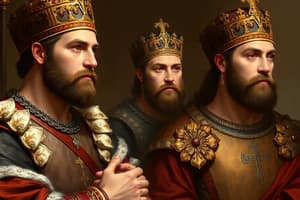Podcast
Questions and Answers
Which aspect of Tudor society was significantly impacted by the monarchs' whims?
Which aspect of Tudor society was significantly impacted by the monarchs' whims?
- Political system (correct)
- Religious system
- Legal system
- Economic system
Which monarch of the Tudor dynasty brought about the Reformation in England?
Which monarch of the Tudor dynasty brought about the Reformation in England?
- Edward VI
- Elizabeth I
- Henry VIII (correct)
- Henry VII
What impact did the Tudor era have on England's international trade?
What impact did the Tudor era have on England's international trade?
- Shift towards land-based trade
- Expansion in international trade (correct)
- No change in international trade
- Decrease in international trade
Which historical event marked a shift in England's religious landscape during the Tudor era?
Which historical event marked a shift in England's religious landscape during the Tudor era?
How did the establishment of the Church of England affect the monarch's role in religious matters?
How did the establishment of the Church of England affect the monarch's role in religious matters?
What was a significant economic force during the Tudor period?
What was a significant economic force during the Tudor period?
Who challenged traditional class divisions in Tudor society?
Who challenged traditional class divisions in Tudor society?
What was a notable literary figure from the Tudor period?
What was a notable literary figure from the Tudor period?
Which architectural marvel was constructed during King Henry VII's reign in the Tudor period?
Which architectural marvel was constructed during King Henry VII's reign in the Tudor period?
What marked the rise of intellectual curiosity and exploration in the Tudor world?
What marked the rise of intellectual curiosity and exploration in the Tudor world?
Flashcards are hidden until you start studying
Study Notes
Unraveling Tudor Society: A Glimpse into England's Golden Age
The Tudor era, spanning from 1485 to 1603, casts a resplendent light on England's history, marking a significant shift in the nation's culture, politics, and economy. During this time, a succession of monarchs from House of Plantagenet, whose ancestors traced their lineage back to King William the Conqueror, reigned over the British Isles. This period witnessed the rise of the powerful Tudor dynasty, which left indelible marks on English society.
Monarchy and Politics
The Tudor monarchs enjoyed a unique position as absolute rulers of their realm. The kingdom's legal, religious, and political systems were largely shaped by the sovereign's whims, leading to a period of great change and innovation. Henry VII and his son, Henry VIII, are particularly well-known for their political prowess and their ambitious foreign policies.
Under Henry VIII, the Reformation altered the religious landscape of England. He broke ties with Rome and established the Church of England, which remains the nation's state church to this day. This break from Catholicism allowed the monarch to assume an even more significant role in religious matters.
Economy and Trade
The Tudor era saw an expansion in international trade, with England participating in the lucrative European markets. Merchant adventurers, such as Sir John Hawkins and Sir Francis Drake, embarked on voyages of discovery and trade, facilitating increased trade with the New World and further afield.
The period also witnessed the rise of the English woolen industry, which became a significant economic force. England's rich woolen cloth trade helped the nation accumulate immense wealth and establish extensive trading networks.
Society and Culture
The Tudor period was a time of great literary and artistic flourishing. The works of William Shakespeare and Sir Thomas More, among others, are quintessential pieces of this golden age.
Tudor architecture is another notable aspect of the period, with the reign of King Henry VII seeing the construction of magnificent castles and palaces, such as the Tower of London, Bodelwyddan Castle, and Hampton Court Palace.
The Renaissance also influenced the Tudor world, bringing about a period of intellectual curiosity and exploration. The establishment of the Royal Schools of Artillery, Gunnery, and Fortification in 1547 attested to the new-found interest in learning and knowledge.
Social Hierarchy
Social hierarchy, based on a rigid class structure, was a defining feature of Tudor society. At the top of the social ladder stood the monarch and the nobility, who exercised considerable power and influence. The gentry, who possessed land and wealth, occupied the next level, followed by the yeomanry and the peasantry.
However, the Tudor era also saw the emergence of a new group, the middle class, which included merchants, craftsmen, and professionals. Led by successful businessmen and professionals, this group challenged the traditional class divisions and exerted pressure for greater social mobility.
Conclusion
The Tudor era, with its rich tapestry of monarchy, politics, economy, society, and culture, beckons us to explore the golden age of England's history. This period saw the birth of a new nation, shaped by the ambitious and visionary Tudor monarchs. The Tudor dynasty's legacy lives on, providing us with a fascinating glimpse into the formative years of the modern British state.
Studying That Suits You
Use AI to generate personalized quizzes and flashcards to suit your learning preferences.




